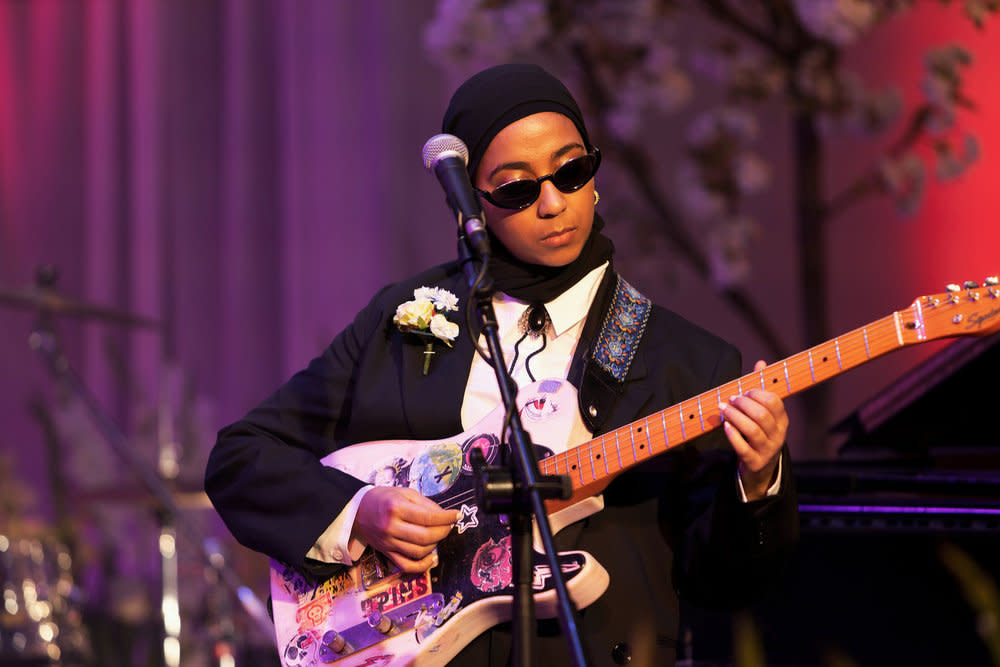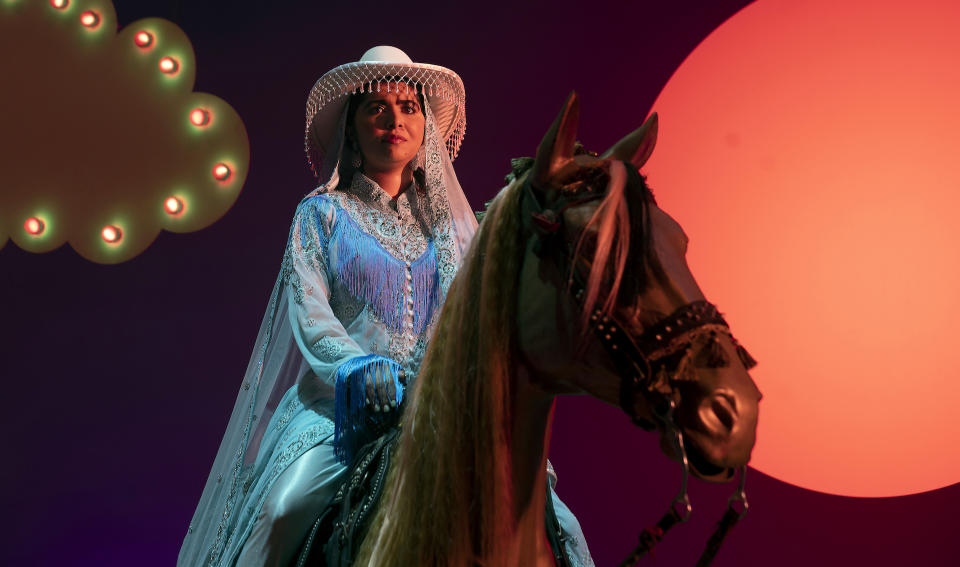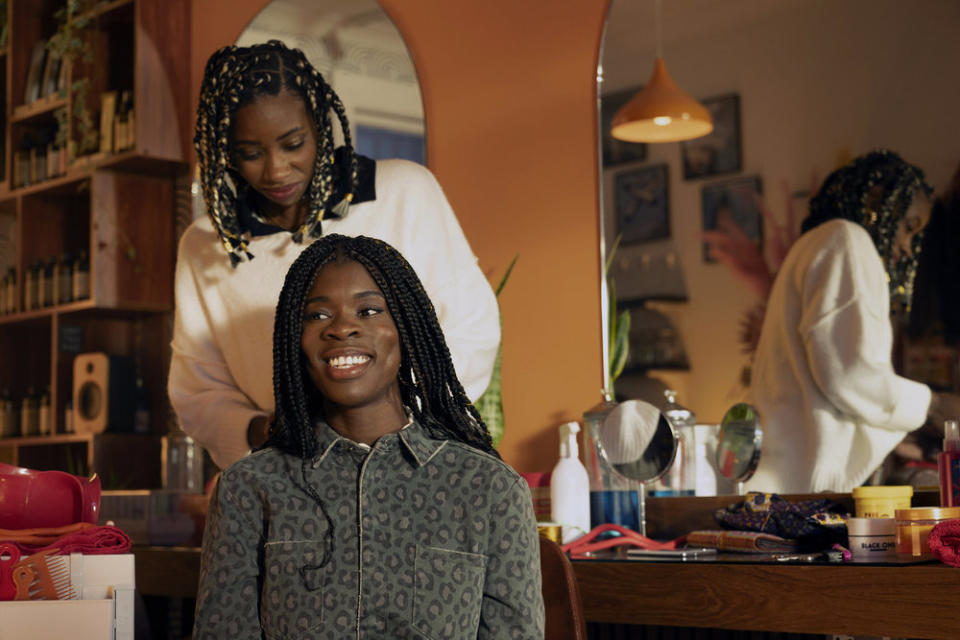‘Polite Society’ Director Nida Manzoor on Returning to ‘We Are Lady Parts,’ Scaling Up, and Digging Deep with Season 2

After a three-year hiatus, “We Are Lady Parts” is back with a triumphant second season, filled with brilliant, catchy music, fantastical comedy sequences, and dynamite performances from the entire ensemble. Unlike a lot of contemporary filmmakers who make the jump from movies to TV, creator Nida Manzoor got to return to her roots after debuting a feature between seasons.
Season 2 (certified Fresh) finds Lady Parts — the all-female punk outfit composed of Amina (Anjana Vasan), Saira (Sara Kameela Impey), Aisha (Juliette Motamed), Bisma (Faith Omole), and manager Momtaz (Lucy Shorthouse) — enjoying a successful run of tours and an actual, engaged fan base. With their sights set on recording an album, the band faces financial struggles and a major opportunity that threatens to break them apart.
More from IndieWire
'Dead Boy Detectives' Showrunner on Why Edwin Had to Confess His Love in Hell
Nicole Kidman Was So 'Pissed Off' on 'Big Little Lies' Set That She Threw a Rock Through a Window
It’s been three years since “We Are Lady Parts” premiered, but Season 2 picks up shortly after Season 1. For writer/director Nida Manzoor, most of the time in between was spent working on “Polite Society,” Focus Features’ delightful action comedy starring Priya Kansara and Ritu Arya. After the dust settled, Manzoor said it was a “fast-moving train” on Season 2 production.
“I dove back in, and it was like, ‘Go go go!'” Manzoor told IndieWire over Zoom. “I felt like I was writing quite fast. It was all moving, which in a way was really helpful because it didn’t give me that much opportunity to stop and freak out like, ‘I’m doing Season 2, it needs to be this, it needs to be that.’ I was just on the train and it was moving.”
Manzoor said that stepping away to work on her first feature, which had itself been years in the making, sharpened her skills as a filmmaker so she felt “much more confident” on Season 2.
“It’s something about working at that scale and then feeling more self-assured. I guess that’s just experience and growth and growing up. I wasn’t sure how I was going to feel about coming back to Season 2. Having made the film, it’s like, do I want to explore new worlds and new characters? But actually, I had such joy. It was so deeply creatively fulfilling to get to go deeper with characters that you’ve already shaped and created. And when you’ve already cast amazing actors, just knowing what they can do allows you to write even more.”
Season 2 manages in just six episodes to dig into Aisha’s queer identity, Bisma dealing with being the only Black woman and mother in the band, Saira struggling with artistic integrity, Amina and Ahsan (Zaqi Ismail) with their friendship, and Momtaz with her career. Everyone has an arc, an obstacle, and plenty of moments to shine (including guest star Malala Yousafzai) — with no dearth of hilarity along the way.
This interview has been edited for length and clarity.

IndieWire: I talk to a lot of people who do film and then come into TV, and have that trial by fire. I cannot remember another time I’ve spoken to someone who did TV, then film, then came back to TV on the same show. Tell me about that and bringing the experience of “Polite Society” with you.
Nida Manzoor: It was amazing to come back to Season 2, and most of my creative team were the same behind the camera, so it was people that I had grown with. A lot of them came with me to “Polite Society,” so everyone was just more experienced and better. It just felt like naturally everything was just leveling up a bit. But I think the key piece was my confidence, because that enabled me to trust and collaborate even more deeply with other creatives. I think that’s really where the show is elevated, in that trusting, that listening, that working with not only the actors, and how I approach the music, how I approached how we shot it — it was just really bringing in those creatives who I built that trust with from Season 1.
It’s so much subtly sharper. There’s so much character work in six episodes. I would love to hear more about that, even in the writing process.
Thank you for recognizing that. They’re short episodes, and there’s five characters, and I’ve really wanted to serve them all, so it’s all about economy of storytelling. That’s also difficult when you’re dealing with a comedy, because sometimes you just want a joke to be a joke. A joke doesn’t have to always push story. It’s so much of this constant push-pull of how much we can go into each story and how we maintain that tone and that fun, so it was a real challenge. But again, having made Season 1 and “Polite Society,” I felt like I was honing those skills. I really work with amazing producers. Surian Fletcher-Jones, who basically picked up the show at Working Title, she has been one person that I will write and then send her scripts, and she would give me notes back. The intimate relationship with that back and forth of crafting and shaping was really important.
And it was just lots of rewriting, lots of getting it down. We were so ambitious in Season 2, bigger set pieces, bigger songs, bigger crowd scenes, that I had to also make it shootable. The tension between we’ve got to be able to shoot this and it be actually feasible to make, but I also find that creatively a challenge. How can I do this within these limitations? There’s something creatively exciting about that too, yeah.
What’s maybe a sequence or a scene in line that sticks out for you?
“Malala Made Me Do It” — creating a whole magical sunset set for one scene that lasts a very short time, and the resource that goes into my amazing costume designer creating basically a unique Western look for each of the girls that is very much grounded in who they are, as well as this incredible look for Malala. A lot of money went into just crafting that for such a short bit of time, but it was the kind of thing that everybody’s like, “Well, yeah, it’s a no-brainer. This is worth that extra resource.” But then we have to think about where we may have to cut our cloth in other scenes.
In the big end sequence of Amina singing to Ahsan on the street, we had cranes going and it was a whole day shoot spent on this song. So it was kind of everywhere. Moloco Studios, which is the recording studios they shoot in — we built that. That’s not a real studio, because we were shooting so much in there. That was expensive, but it really allowed Amy McGuire, my amazing production designer, to design that set and make it so we could shoot in it. We could take the ceiling off, we could do the wire work. We could do the “Glass Ceiling Feeling” stuff. It made it more suitable, but it was a big spend that we hadn’t done on Season 1.

Going back to the character work, definitely digging into the intersectionality this season with Aisha and with Bisma. I was really moved by those stories. What went into those story choices? Those are difficult stories to write, especially with so few episodes.
I think in Season 1 there just wasn’t the real estate for that. It was so much setting up the story and very Amina’s world, so I just felt Season 2 I wanted to go deeper in all those other characters. A lot of that nuance and that complexity that we see in Bisma’s storyline and Aisha’s storyline came also out of my writer’s room. I think I’m always drawn to those areas where it’s complex, it’s gray, there’s no one right or wrong answer of how to move through it. There’s no neat bow. Whenever there’s no neat bow, I think it’s exciting.
Whenever my group of Muslim women in this writers room were having these conversations, these intimate arguments and discussions, that was what was exciting to me. And it was often these questions around, like, “How would you express your queerness and be Muslim?” And with Bisma’s story, she’s dealing with the intersection, intersection of being a Black woman and a mother, which is unique to her. The discussions that came out in the writers room really made me realize this is meaningful, and was something I definitely wanted to put in Season 2. I co-wrote Episode 4, which is Bisma’s main storyline, with the incredible writer Rashida Seriki, who brought so much of her own understanding, personal experience, and nuance to that. It really elevated that storyline.
And at the same time, I’m really fascinated by how the back half goes into the political, social responsibility of artists, if they have one. Those conversations are so interesting and also very meta at the same time.
There is a meta element. A lot of that conversation that you see in Episode 5, where all the girls are having these different points of view in how they should approach their work as artists, was a conversation I basically had with all my writers in our writers room — in part, sometimes almost verbatim. Again, it was the excitement of something that feels so topical and so meaningful to all these women, all these Muslim women artists. But also, there’s so many ways to look at it that I was like, “This is a scene for the band. This is something that feels very pertinent to go into.” Also from my own personal experience, especially earlier on in my career, where I was really trying to navigate how to maintain my integrity whilst also wanting to engage with art that is for the mainstream, not always feeling niche and only like for a few people. I wanted the art to to reach many people, but at what cost? [That] was certainly something that I felt like I was navigating earlier on, so that was something I drew from for sure.
I was also thinking about how, as brown women, Muslim women, there’s this whole narrative that your existence is political, which is a lot of pressure.
There’s so many layers to it. There’s so many ways of of approaching and looking at it honestly, that I felt so lucky to be writing an ensemble show, because then you get to have that complexity of conversation.
One thing I love so, so much about the show is how all of the adult or parent figures are super fun and supportive. We don’t see that a lot in Desi stories especially. Was that inspired by specific role models? It must free you up a lot in terms of storytelling too.
A lot of it came from, as you said, the frustration of seeing that the classic portrayal is South Asian parents or Muslim parents being kind of oppressive, which is certainly not my experience, so I wanted to show a different way of being. It was so much inspired by my own parents and their love of silliness and fun and and levity. I have a character, Sister Squire, who is a generation above Lady Parts, but who was like a punk from that time; I wanted her to be complex and not just be this super supportive, “You go, girl” figure. I wanted her to have an ego, grapple with her own bitterness, but also be supportive — have all these idiosyncrasies that I’ve afforded my main girls, and I wanted to give to to that character as well. I got to cast Meera Syal, who is my literal comedy hero, so that was a mind-blowing, insane experience. She is nothing like Sister Squire. She is, I must say, for the record, so kind, so supportive, so generous. But it was really fun to get to work with her, because she’s kind of my hero.
You’ve been working on “We Are Lady Parts” since 2018, and “Polite Society” was a long journey to get made, so I don’t want to pressure you about what’s next, but what’s it like just being on the other side of this? Where do you see yourself refocusing your energy?
It’s really nice to be on the other side of it. It’s the first time since we started from 2018 to now that I’ve not had the next thing just coming at me full force. So I’m open to what’s next. I really love playing in genre, I’m kind of developing a sci-fi alien show, which is like a dark comedy and also like a crazy alternative Bond, spy, action film just for fun. But there’s nothing like, “Now, I’m jumping onto this.” I think I’m trying to take a beat. I’m trying to do the non-good girl, Desi, wanting to constantly be working, and be like, “You know what? Maybe I’ll take a beat.” Maybe do a little self-care, be in my own villain era, just take a beat and then see what actually appeals to me.
“We Are Lady Parts” Season 2 is now streaming on Peacock.
Best of IndieWire
Unsimulated Sex Scenes in Film: 'Nymphomaniac,' 'The Brown Bunny,' 'Little Ashes,' and More
Every Palme d'Or Winner from the Cannes Film Festival, Ranked
The 13 Best Thrillers Streaming on Netflix in May, from 'Fair Play' to 'Emily the Criminal'
Sign up for Indiewire's Newsletter. For the latest news, follow us on Facebook, Twitter, and Instagram.


